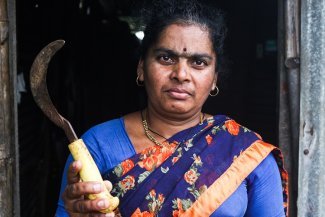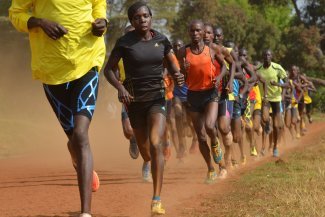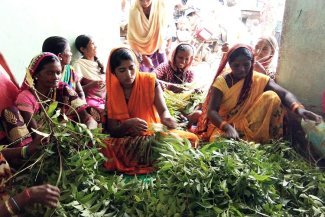Champion kabaddi player Vikas Gaikwad has stopped training because the negative impact of climate change on his family’s sugarcane crops means that he now has to focus his time on farming and earning extra money. Although he still plays the game, these days he goes directly to competitions without training, which makes him vulnerable to injuries and fractures.
It took over 3,000 days for Pooja Patil to earn a Taekwondo black belt and just 240 days for her to drop out of the sport. “It was the most painful moment of my life,” she says.
After earning a black belt in late 2018, she was prepared to make a career in Taekwondo. But her hopes of competing in the Olympics and starting her own Taekwondo classes were derailed within a year.
Since 2019, floods have become a recurring phenomenon in Kolhapur, a district in the western coastal state of Maharashtra. Some 11.42 million hectares of farmland were destroyed across India during 2019-2020 by floods, heavy rainfall and landslides. It was an almost seven-fold increase on the devastation of the previous year, which saw the destruction of 1.7 million hectares of land.
“Floods wiped away over 100 tonnes of sugarcane on our 1.5 acres of land in merely four days,” recalls the 19-year-old from Khochi village in Kolhapur. Had they been able to sell the crop, it would have fetched her family at least 290,000 Indian rupees (€3,250).
“Only four tonnes was left behind. We couldn’t even recover the cost of production,” she says. What followed was a vicious cycle of debt. “I had to make a career somehow, and so I decided to pursue a pharmacy course.” For this, she took out a loan of €1,125 in 2020.
Within nine months, another flood devastated her family’s farm and house, pushing them even further into a cycle of debt. Unable to hire farmworkers, Patil began toiling in the fields and milking cows in 2019, using all of her strength from the Taekwondo sessions. This began taking away from her Taekwondo training time, and eventually, she quit the sport.
However, shifting careers has come at a great cost. Although Patil is due to graduate later this year, she is nervous about what may come next. “Immediately after graduating, I will have to start repaying the loan, which is stressing me a lot,” she says with an anxious face. High unemployment rates across India mean that finding a job is likely to be difficult for Patil, who will probably have to migrate to a bigger city for a better paying job – thus incurring additional costs.
“Under such circumstances, it becomes tough to train,” explains her coach Amit Jambhale, who trained her for seven years. Jambhale, who trains over 50 students now, says that almost all his top-performing athletes quit Taekwondo after recurring floods. Over 40 of his students are adolescents, most struggling with trauma.
But what he is observing isn’t restricted to Khochi. A research paper found that eight months after the 2018 floods in the Alappuzha district of the southern Indian state of Kerala, 35 per cent of the 670 students surveyed were diagnosed with post-traumatic stress disorder. Moreover, 50 per cent of students reported traumatic flood memories at least twice weekly.
From athletes to farmers and factory workers
Vikas Gaikwad always wanted to become a kabaddi player (a South Asian contact sport played between two teams of seven players each). “I started practising when I was in grade four [aged 10],” he recalls, sitting around a 200-year-old well, built by his great grandparents, surrounded by a banyan tree.
While his village, Jambhali, in Maharashtra’s Kolhapur district, hasn’t experienced any floods, the associated losses are compounding. The family has reported declining sugarcane production for the past four years. “Since 2019, the rainfall pattern has become unpredictable. In 2022, the monsoon rainfall was late by a month, and then it rained a lot for a few days, following a larger spell of no rains,” he recalls, leading to massive losses.
Last October, when the sugarcane was due to be harvested, it rained heavily, destroying most of the produce. The October rains devastated crops on over 2.8 million hectares of land in Maharashtra’s 33 districts alone. Eventually, it pushed the family into a debt of over €1,110.
As a result, Vikas started doing the difficult tasks in farming which they once managed by hiring labourers. Now, this is no longer enough. He also works in a sugarcane nursery to support the family. Currently, he is also pursuing a course in arts and preparing for the Indian Army entrance examination. “In case nothing works, I am planning to start some business,” he says, visibly exhausted.
Kabaddi, once a major part of his life, now rarely finds a space. “Now, I go to the matches directly without practising. It has completely changed my game as I am more at risk of fractures and injuries because I have stopped working out.”
Jambhale says this is quite risky. “An athlete requires the right diet, consistent training, and the proper mindset. You hamper even a single parameter, and it leads to disastrous results, which often backfire,” he explains.
Ever since Gaikwad stopped training three years back, he says he has gained around 15 kilograms and now has to compete in a higher weight group. “Earlier, I competed in the 35-40 kilograms group, which was better.”
He adds: “It will take at least a year to recover from here if I start training three to four hours daily.” However, every extra hour spent outside the field pushes the family further into debt. “It takes at least three months to master one kabaddi trick. The competition is so severe that missing even a single workout session can affect the game,” says renowned kabaddi coach Pandurang Terase, who has been coaching for over four decades.
Another hindrance to training is that his teammates are going through a similar crisis. “All of us are either working in the fields full time or have picked some job in a factory,” he says.
The losses aren’t restricted to his friends from the nearby flood-affected villages. Between 1953 and 2020, floods affected 2.2 billion people in India, roughly 187 times the population of Belgium. In addition, it caused crop losses of approximately €14.75 billion.
Community healthcare worker Chhaya Kamble from Ganeshwadi village, who has worked extensively in flood-affected areas, says that rural athletes can’t afford costly sports diets. So, they rely on whatever grows in their field. “Flood not just destroyed their houses, but even took away their diet, which has crippled their physical health as well,” she explains.
“Girls are not given a chance”
Whenever Patil looks back at her black belt, she remembers British Taekwondo athlete Bianca Walkden, a double Olympic medallist, whom she looks up to as a role model.
“I always look at my black belt and feel sad that I couldn’t make a career in something I have been pursuing since I was in grade three,” she says. However, Taekwondo wasn’t just her dream but a daily getaway from all her problems. “Training every day also helped her find a solace from daily pressures, especially the recurring thoughts of mounting debt and anxiety caused by the changing climate,” explains her coach, Jambhale.
A flood victim himself, Jambhale is now visiting the athletes who dropped out and is trying to get them back to Taekwondo. “So far, it hasn’t been successful. I can’t blame the students. Their conditions are worsening with every rainfall.”
Further, this has led to a societal crisis. For instance, another community healthcare worker Shubhangi Kamble (no relation) from Kolhapur’s flood-affected Arjunwad village says: “Ever since the 2019 floods, there have been rising instances of substance abuse, especially alcoholism.”
Also, the students who drop out to make ends meet often end up working in vineyards spraying chemical pesticides, in brick kilns, or as sugarcane cutters. “These tasks are extremely exploitative and require a lot of physical work, often pushing them to move towards alcohol to find relief,” she says.
A study conducted in the south Indian state of Karnataka’s Kodagu district found that 4-6 months after the floods, 15.80 per cent of victims reported substance abuse. Of the 171 people surveyed, 66.7 per cent reported psychiatric symptoms.
Moreover, Kamble has also seen multiple cases of domestic violence caused by rampant alcoholism. The gendered impacts of climate change, she says, are much more brutal. “If a girl has quit sport and is home for even a year, she’s married off,” says Shubhangi Kamble. “Girls are not even given a chance.”
Mounting debt and descending mental health
The bigger challenge for Patil is repaying her loan, which she had taken from a bank at a nine per cent interest rate. Often the thought of mounting debt derails the performance of several athletes, as Jambhale says: “At least for three months after the flood, none of my students can focus.” While they can’t afford to train like elite athletes, managing even two hours workout sessions is becoming difficult.
This has spiralled into rising instances of helplessness and irritability amongst the younger population of the village. However, accessing mental healthcare is a long-term endeavour. For the 833 million people who stay in villages across India, there are just 764 public district hospitals. Research published in the Indian Journal of Psychiatry found that as of 2019, India had 9,000 psychiatrists and 1,000 psychologists for a population of 1.3 billion people. The report further found that India will take another 171 years to meet an adequate number of psychiatrists.
In its latest report, the United Nations’ Intergovernmental Panel on Climate Change (IPCC) stated that: “Climate change has adversely affected human physical health globally and mental health in assessed regions and is contributing to humanitarian crises where climate hazards interact with high vulnerability.”
Despite facing heat waves, floods, hailstorms, and erratic rainfall, all within the last five years, Patil’s father, Vijay, 62, kept supporting her. “But how could I ask them to fund my coaching and diet when our entire family was in debt?” she asks. “It was my moral responsibility to help the family, and so I quit,” says Patil holding her black belt.
Her younger brother, Ketan, 17, followed her and quit Taekwondo after five years of training. “We were the first in our family to learn any sport formally. This loss feels so personal,” says Ketan.
Both credit their father for helping them move ahead in sports which are often discouraged to pursue in several Indian villages. “Even today, he keeps asking me to resume Taekwondo training,” she says.
However, the reality of becoming athletes for Patil siblings, Gaikwad, and thousands of other rural athletes is fading rapidly and depends on the rain. “I once loved rains, but now every rainfall reminds me of the flood,” says Patil.













